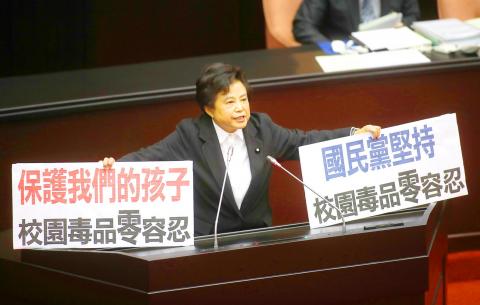The Legislative Yuan yesterday passed amendments to the Narcotics Hazard Prevention Act (毒品危害防制條例) allowing courts to seize illicit gains from the sale of narcotics.
People who sell or transfer narcotics of any class, or grow, sell or transfer opium poppy, cocaine or cannabis plants would have any belongings or property proved to be illicit gains from the infractions seized, one amendment says.
Authorities do not need to wait until a court ruling is passed before destroying seized narcotics that are difficult to produce or preserve, another amendment says.

Photo: CNA
The thresholds for punishments related to the possession of class C or D drugs were also lowered.
People found in possession of more than 5g of any class C drug would be subject to a jail term of up to two years or a maximum fine of NT$200,000, while those found with more than 5g of class D narcotics would face a prison term of up to one year or a fine of up to NT$100,000. Previously, people found in possession of more than 20g of class C drugs faced a prison term of up to three years, which could be commuted to a NT$300,000 fine, while those in possession of more than 20g of class D narcotics faced a jail term of up to one year or a fine of NT$100,000.
Due to the high costs often associated with making “standard samples,” either the synthesis of new drugs or importing samples from abroad, the amendments allow narcotics inspection agencies to take a small portion of new drugs seized to be used as samples.
People who force or coerce a minor or pregnant woman to use illicit drugs, or cause them to do so by any other means, could face a prison term 1.5 times longer, another amendment says.
People found to have manufactured, sold, transported or enticed others to take a mixture of narcotics of different classes would face charges governing the higher-ranked drugs, as well as a prison term 1.5 times longer than the penalty if their crime involved only one kind of drug, the amendments say.
To reduce the period in which no legal action may be taken for new narcotics, the amendments stipulate that drugs with similar chemical formulas may be reviewed immediately and classified at drug reviews held every three months by the Ministry of Justice, and the Ministry of Health and Welfare.
As not everyone who uses controlled substances develops an addiction, one amendment stipulates that such offenders may be ordered to perform community service, or undergo therapy or counseling as an alternative to rehabilitation.

Right-wing political scientist Laura Fernandez on Sunday won Costa Rica’s presidential election by a landslide, after promising to crack down on rising violence linked to the cocaine trade. Fernandez’s nearest rival, economist Alvaro Ramos, conceded defeat as results showed the ruling party far exceeding the threshold of 40 percent needed to avoid a runoff. With 94 percent of polling stations counted, the political heir of outgoing Costa Rican President Rodrigo Chaves had captured 48.3 percent of the vote compared with Ramos’ 33.4 percent, the Supreme Electoral Tribunal said. As soon as the first results were announced, members of Fernandez’s Sovereign People’s Party

MORE RESPONSIBILITY: Draftees would be expected to fight alongside professional soldiers, likely requiring the transformation of some training brigades into combat units The armed forces are to start incorporating new conscripts into combined arms brigades this year to enhance combat readiness, the Executive Yuan’s latest policy report said. The new policy would affect Taiwanese men entering the military for their compulsory service, which was extended to one year under reforms by then-president Tsai Ing-wen (蔡英文) in 2022. The conscripts would be trained to operate machine guns, uncrewed aerial vehicles, anti-tank guided missile launchers and Stinger air defense systems, the report said, adding that the basic training would be lengthened to eight weeks. After basic training, conscripts would be sorted into infantry battalions that would take

GROWING AMBITIONS: The scale and tempo of the operations show that the Strait has become the core theater for China to expand its security interests, the report said Chinese military aircraft incursions around Taiwan have surged nearly 15-fold over the past five years, according to a report released yesterday by the Democratic Progressive Party’s (DPP) Department of China Affairs. Sorties in the Taiwan Strait were previously irregular, totaling 380 in 2020, but have since evolved into routine operations, the report showed. “This demonstrates that the Taiwan Strait has become both the starting point and testing ground for Beijing’s expansionist ambitions,” it said. Driven by military expansionism, China is systematically pursuing actions aimed at altering the regional “status quo,” the department said, adding that Taiwan represents the most critical link in China’s

EMERGING FIELDS: The Chinese president said that the two countries would explore cooperation in green technology, the digital economy and artificial intelligence Chinese President Xi Jinping (習近平) yesterday called for an “equal and orderly multipolar world” in the face of “unilateral bullying,” in an apparent jab at the US. Xi was speaking during talks in Beijing with Uruguayan President Yamandu Orsi, the first South American leader to visit China since US special forces captured then-Venezuelan president Nicolas Maduro last month — an operation that Beijing condemned as a violation of sovereignty. Orsi follows a slew of leaders to have visited China seeking to boost ties with the world’s second-largest economy to hedge against US President Donald Trump’s increasingly unpredictable administration. “The international situation is fraught